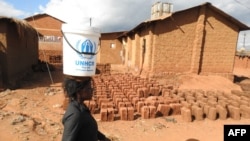The exercise, which started this week, follows the expiration of the April 15 deadline set by Malawi in February for about 8,000 refugees to voluntarily relocate to the camp. Police say about 400 families were evicted from their homes and business premises in some areas of capital, Lilongwe.
The government says those staying outside the camp are a threat to national security and also violate policies which prohibit refugees from staying or doing business outside the Dzaleka camp.
Patrick Botha, the spokesperson for the Ministry of Homeland Security in Malawi, said that police and immigration officers have so far flushed out 408 refugees including 100 children who are kept temporarily at a prison facility in the capital, Lilongwe.
"We have undertaken a screening process," he said, "to isolate those who have refugee status so that they can go back to the camp, and then those that have valid business permits so that they go back to normal life."
Botha said the exercise comes after noting that many foreigners who had their refugee status rejected flock to cities and towns where they do business illegally.
"It is these people we are trying to flush out," he said, "because they are not supposed to be in the country and...instead of going back, they decided to infiltrate localities, towns, cities and other areas (which) poses a threat to national security."
Dzaleka, the home to refugees and asylum-seekers from Burundi, the Democratic Republic of the Congo, Ethiopia, Rwanda and Somalia, was meant to accommodate about 10,000 refugees but now is home to more than 50,000.
However, the UN refugee agency, UNHCR, and rights campaigners have long argued that relocating them to the highly congested camp violates the rights of those affected.
Many refugees who have so far returned to Dzaleka say that they are sleeping in the open with no food and clothes.
Raphael Ndabagha, a refugee from the Democratic Republic of Congo, said, "they haven’t prepared any place to accommodate those who don’t have any place to live. Apart from the COVID-19 quarantine center, there is no other place to accommodate (them)."
However, Botha said the exercise is ongoing and that the government is providing all necessary care including food for those who are temporarily sheltered in prisons.







